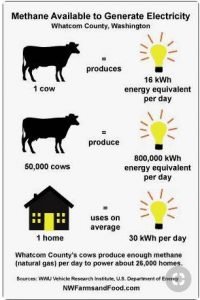The advantages of biogas are many. Among the greatest advantages are that the renewable energy produced, substitutes fossil fuels and thus reduces the emissions of greenhouse gases. Plus, it does it at a cost much lower than by most other techniques. In addition to the multiple renewable energy advantages of biogas are the soil fertilizer and improvement products that are produced as a result of digesting organic waste and converting it to renewable energy.

Perhaps the advantage we like best are the social advantages of biogas. These are major, including improving health by lessening indoor smoke inhalation, improving sanitation through the installation of toilets attached to the biogas units, and saving time collecting fuel-wood for women and children.
Primarily biogas use is for direct combustion and heat production, but farmers utilize biogas as well for:
- cooking,
- heating the farm,
- farm level electricity generation,
- organic waste recycling,
- efficient fertilizer production,
- waste disposal,
- veterinary sanitation,
- odor removal and,
- greenhouse gas (GHG) emission reduction.
National Perspectives on the Benefits of Biogas
Those nations which started first to develop anaerobic digestion (AD) infrastructure are now truly reaping the benefits. For example, the Swedish biogas association has called on the Swedish government to develop a long-term strategy where “all the advantages of biogas are valued”. But, outside the wealthy world of nations like Sweden, grass roots AD plant users are also placing pressure on administrators to improve AD subsidies.
Wood fuel scarcity, increasing energy costs and pressure for land in the high potential County of Vihiga, in Kenya, means that the advantages of biogas are becoming more apparent to eligible households. The reasons is once again, the “multi-pronged and long-term benefits of biogas are already noticeable in villages”.

In an age of worrying climate change and looming fossil energy decline, the advantages of biogas are obvious, but other advantages are less obvious. As alluded to earlier, the addition to the multiple renewable energy benefits of biogas is in developing local skills and a biogas plant service industry.
One way to cut biogas production costs and expand biogas use, is to train local technicians to make biogas stoves, lamps and other equipment. This was pointed out by Kuda Mudokwani, a researcher specializing in climate change and disaster risk reduction at the Fambidzanai Permaculture Centre, a non-governmental organisation in Matabeleland South, in southwestern Zimbabwe.
The choice of the best biogas use is made for each site in developed nations is best made by considering first of all the other there is a local user for the energy (for example in a factory). Second, producers should consider what it would cost to connect the biogas plant to the electricity network, and thirdly whether there is an opportunity to connect to a pressure gas pipeline. Regional ecological potential, social sustainability, regional economy and local biogas use should often also be assessed.
Social Advantages of Biogas
The social advantages of biogas are manifold, including improving health by lessening indoor smoke inhalation, reducing disease by better hygiene through the installation of toilets. These can be drained into the biogas units. They also, by enabling good quality light-mantle based gas lamp lighting, gain from an extended schoolwork day for children to study their homework into the evenings. To say this in another way it is said that, in addition to the health and well-being advantages of biogas for women and children, the rest of nature also benefits.
When opposition is encountered to biogas plant construction, benefits which may assist AD planners are the access to energy and the contribution to climate change mitigation. Also, never assume that people are aware that biogas-use will reduce the over consumption of forest resources. So ensure that this benefit is one which the planners and local opinion influencers are well briefed about. To be thorough a new biogas application should include various options for biogas use, described and explored, and an overview of project costs and revenues.

Never forget that, biogas use is considered to be CO2-neutral, and that means that it does not give rise to an increase in the volume of greenhouse gases. Emphasise that a new dawn is possible where the limit on energy use imposed by the current urgent need to reduce fossil fuel use in order to preserve our climate on earth, will be lifted.
Once ample supplies of renewable biogas energy become available the limit to its use will only be limited to the amount that can be produced. That will mean that those that want to waste energy on powerful sports cars, and leave their windows open in cold weather, can ethically do that. All they will need to do will be to pay for the energy they use!
Conclusion to our Article on the Advantages of Biogas
Increased ease and profitability of biogas use will accelerate uptake of biogas technology, enhancing energy production sustainability, while reducing agricultural production costs. Not to forget that many new and valuable jobs will be created in the rural scene, by the biogas service industry.

There is much more work to do yet to make biogas generation better, simpler, and more productive so that the advantages of biogas are greater than they are now. The economic advantages of biogas should not be seen as limited only in the alternative of traditional energy. Increasing economic trade locally, and efficiency improvement measures are also not only needed but still significant, as well as the further development of environmental and social benefits.
Now is the time for further research into all areas of biogas production, and biofertilizer efficiency improvement. There is every chance that such research will yet provide huge gains. After all, research into solar panel technology has been ongoing for 30 years and only now providing truly low-cost equipment. The main force of research into biogas plant efficiency only began less than 10 years ago. Also, don't forget that it is a fact that if AD plants were to match a cow's stomach in efficiency they could be reduced to approximately one fifteenth of the current volume.







I especially like the final sentence! The creator’s designs are best. Where is the source of the analysis, please? Also, was it compared with the largest AD plants?
Hi! Brian. Glad you are keeping me on my toes!
I usually produce my content by curation with links back to the originators for verification. This article was a combination of my own thoughts and online research and as you have spotted does not provide sources.
If you mean source of the analysis for the claim that “if AD plants were to match a cow’s stomach in efficiency they could be reduced to approximately one fifteenth of the current volume”. My source for that was the website of an on-farm UK AD Plant where they showed a neat graphic of their plant shrunk to the size it would be if as efficient as a cow.
I cannot now find that website to refer you to it, but I have now found another reference to comparable efficiencies where they say “According to the organisers of a two-day conference taking place in London, a cow‘s stomach is 20-to-30 times better at producing biogas compared to the nearest man made equivalent, which would explain a desire within the anaerobic digestion (AD) industry to understand and replicate processes that take place in nature.” At theengineer.co.uk The conference referred to is the, “7th annual Anaerobic Digestion and Bioresources Association Research & Innovation Forum 2017”.
And, yes. I think they are referring to “standard” large UK and European AD plants (Single-Stage Mesophilic CSRs).
I hope that helps to answer your question.
Where can you buy biogas gas mantles. Are standard mantles OK?
Loved your opinion. This is why I am on internet. Don’t think it’ll catch on though.
People just want to know about trash and garbage, they will always ignore something like this.
It’s just not nice to remind people about waste, just like they don’t want to know about climate change.
The most important question is how much the system will cost. The fact that this is a wonderful approach to assist farmers in lowering their costs raises the question of whether it is cost effective enough for the small farmer to afford to install it. For the tiny farm, I’ve been looking at small gas generators that can be used for cooking and fertiliser production, but they’re prohibitively costly.